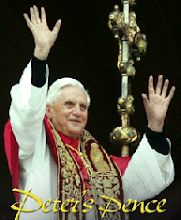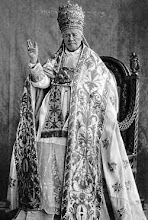
"Oh, race of Franks, race from across the mountains, race chosen and beloved by God as shines forth in very many of your works set apart from all nations by the situation of your country, as well as by your Catholic Faith and the honor of the Holy Church! To you Our discourse is addressed and for you Our exhortation is intended. We wish you to know what a grievous cause has led Us to your country, what peril threatening you and all the faithful has brought Us.
From the confines of Jerusalem and the city of Constantinople a horrible tale has gone forth and very frequently has been brought to Our ears, namely, that a race from the kingdom of the Persians, an accursed race, a race utterly alienated from God, a generation forsooth which has not directed its heart and has not entrusted its spirit to God, has invaded the lands of those Christians and has depopulated them by the sword, pillage and fire; it has led away a part of the captives into its own country, and a part it has destroyed by cruel tortures; it has either entirely destroyed the Churches of God or appropriated them for the rites of its own religion. They destroy the altars, after having defiled them with their uncleanness. They circumcise the Christians, and the blood of the circumcision they either spread upon the altars or pour into the vases of the baptismal font. When they wish to torture people by a base death, they perforate their navels, and dragging forth the extremity of the intestines, bind it to a stake; then with flogging they lead the victim around until the viscera having gushed forth the victim falls prostrate upon the ground. Others they bind to a post and pierce with arrows. Others they compel to extend their necks and then, attacking them with naked swords, attempt to cut through the neck with a single blow. What shall I say of the abominable rape of the women? To speak of it is worse than to be silent. The kingdom of the Greeks is now dismembered by them and deprived of territory so vast in extent that it can not be traversed in a march of two months. On whom therefore is the labor of avenging these wrongs and of recovering this territory incumbent, if not upon you? You, upon whom above other nations God has conferred remarkable glory in arms, great courage, bodily activity, and strength to humble the hairy scalp of those who resist you.
Let the deeds of your ancestors move you and incite your minds to manly achievements; the glory and greatness of king Charles the Great, and of his son Louis, and of your other kings, who have destroyed the kingdoms of the pagans, and have extended in these lands the territory of the Holy Church. Let the Holy Sepulchre of the Lord Our Saviour, which is possessed by unclean nations, especially incite you, and the holy places which are now treated with ignominy and irreverently polluted with their filthiness. Oh, most valiant soldiers and descendants of invincible ancestors, be not degenerate, but recall the valor of your progenitors.
But if you are hindered by love of children, parents and wives, remember what the Lord says in the Gospel, "He that loveth father or mother more than Me, is not worthy of Me." "Every one that hath forsaken houses, or brethren, or sisters, or father, or mother, or wife, or children, or lands for My name's sake shall receive an hundredfold and shall inherit everlasting life." Let none of your possessions detain you, no solicitude for your family affairs, since this land which you inhabit, shut in on all sides by the seas and surrounded by the mountain peaks, is too narrow for your large population; nor does it abound in wealth; and it furnishes scarcely food enough for its cultivators. Hence it is that you murder one another, that you wage war, and that frequently you perish by mutual wounds. Let therefore hatred depart from among you, let your quarrels end, let wars cease, and let all dissensions and controversies slumber. Enter upon the road to the Holy Sepulchre; wrest that land from the wicked race, and subject it to yourselves. That land which as the Scripture says "floweth with milk and honey," was given by God into the possession of the children of Israel. Jerusalem is the navel of the world; the land is fruitful above others, like another paradise of delights. This the Redeemer of the human race has made illustrious by His advent, has beautified by residence, has consecrated by suffering, has redeemed by death, has glorified by burial. This royal city, therefore, situated at the centre of the world, is now held captive by His enemies, and is in subjection to those who do not know God, to the worship of the heathens. She seeks therefore and desires to be liberated, and does not cease to implore you to come to her aid. From you especially she asks succor, because, as we have already said, God has conferred upon you above all nations great glory in arms. Accordingly undertake this journey for the remission of your sins, with the assurance of the imperishable glory of the Kingdom of Heaven."
When Pope Urban had said these and very many similar things in his urbane discourse, he so influenced to one purpose the desires of all who were present, that they cried out, "It is the will of God! It is the will of God!" When the venerable Roman pontiff heard that, with eyes uplifted to heaven he gave thanks to God and, with his hand commanding silence, said:
"Most beloved brethren, today is manifest in you what the Lord says in the Gospel, "Where two or three are gathered together in My name there am I in the midst of them." Unless the Lord God had been present in your spirits, all of you would not have uttered the same cry. For, although the cry issued from numerous mouths, yet the origin of the cry was one. Therefore I say to you that God, who implanted this in your breasts, has drawn it forth from you. Let this then be your war-cry in combats, because this word is given to you by God. When an armed attack is made upon the enemy, let this one cry be raised by all the soldiers of God: It is the will of God! It is the will of God!
And We do not command or advise that the old or feeble, or those unfit for bearing arms, undertake this journey; nor ought women to set out at all, without their husbands or brothers or legal guardians. For such are more of a hindrance than aid, more of a burden than advantage. Let the rich aid the needy; and according to their wealth, let them take with them experienced soldiers. The Priests and clerks of any order are not to go without the consent of their bishop; for this journey would profit them nothing if they went without permission of these. Also, it is not fitting that laymen should enter upon the pilgrimage without the blessing of their Priests.
Whoever, therefore, shall determine upon this holy pilgrimage and shall make his vow to God to that effect and shall offer himself to Him as a, living sacrifice, holy, acceptable unto God, shall wear the sign of the cross of the Lord on his forehead or on his breast. When,' truly',' having fulfilled his vow he wishes to return, let him place the cross on his back between his shoulders. Such, indeed, by the twofold action will fulfill the precept of the Lord, as He commands in the Gospel, "He that taketh not his cross and followeth after Me, is not worthy of Me."
Robert the Monk was present at the Council of Clermont, at which Blessed Pope Urban II gave this powerful discourse. He recorded it for prosperity.
Source:
Dana C. Munro, "Urban and the Crusaders", Translations and Reprints from the Original Sources of European History, Vol 1:2, (Philadelphia: University of Pennsylvania, 1895), 5-8







































